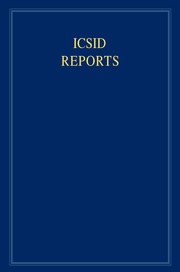No CrossRef data available.
Article contents
Apotex Holdings Inc. and Apotex Inc. v. United States of America
Published online by Cambridge University Press: 22 November 2021
Abstract
Procedure — Amicus curiae — ICSID Arbitration (Additional Facility) Rules, Article 41(3) — Whether the non-disputing party’s submission provided assistance to the tribunal — Whether the non-disputing party’s submission addressed matters within the scope of the dispute — Whether the non-disputing party had a significant interest in the arbitration — Whether there was public interest in the subject matter of the arbitration — Whether the non-disputing party’s submission created disruption, burden or prejudice affecting the disputing parties — Whether the non-disputing party complied with disclosure requirements
Procedure — Seat of arbitration — Lex loci arbitri — Whether the tribunal was bound to select a seat of arbitration in the State of either party — Whether the tribunal should consider laws of the proposed seat of arbitration regarding arbitrator immunity or quorum requirements — Whether municipal law regarding deference to executive interpretation of treaty law in the event of judicial review of an arbitral award weighed against a proposed seat of arbitration
Jurisdiction — Investment — Foreign investor — Meaning of “relating to” — NAFTA, Article 1101 — NAFTA, Article 1116 — NAFTA, Article 1117 — NAFTA, Article 1139 — Whether the challenged measure related to an investment or an investor — Whether “relating to” required a legally significant connection under municipal law or merely an effect in fact — Whether the claimants’ ability to sell other products was relevant to assessment of jurisdiction
Jurisdiction — Investment — Applicable law — Res judicata — NAFTA, Article 1139 — NAFTA, Article 1136(1) — Whether the concept of res judicata was applicable to NAFTA arbitrations — Whether the conditions were met for res judicata — Whether res judicata could create issue estoppel based on the reasoning of a prior award or only the operative parts of the prior award — Whether distinctions existed between the investment at issue in the prior award and the present arbitration
Jurisdiction — Investment — NAFTA, Article 1139 — Intangible property — Whether a marketing authorisation was an investment made in the territory of the host State
Evidence — Burden of proof — Most-favoured-nation treatment — National treatment — Document production — Whether the evidential burden of proof can shift from the claimant to the respondent due to limited document production
National treatment — NAFTA, Article 1102 — Whether the domestic comparators had been afforded more favourable treatment — Whether the domestic comparators were in like circumstances to the claimants
Most-favoured-nation treatment — NAFTA, Article 1103 — Whether foreign comparators had been afforded more favourable treatment — Whether foreign comparators were in like circumstances — Whether the claimants had been targeted by authorities for political reasons — Whether the conduct of the claimants distinguished their circumstances from foreign comparators
Minimum standard of treatment — NAFTA, Article 1105 — Customary international law — Public health — Due process — Whether the minimum standard of treatment under customary international law required regulatory due process — Whether there was evidence of State practice in favour of regulatory due process forming part of the minimum standard of treatment — Whether an international tribunal should defer to regulatory bodies responsible for protecting public health — Whether regulatory conduct met the required threshold of severity and gravity
Most-favoured-nation treatment — NAFTA, Article 1103 — Minimum standard of treatment — NAFTA, Article 1105 — Non-impairment — Effective means of protection — Whether importing standards of non-impairment and effective means of protection from a BIT would provide more favourable protection than the minimum standard of treatment — Whether a standard of non-impairment would have produced a different outcome for the claimants — Whether the standard of effective means of protection in judicial proceedings applied to a regulatory context
Costs — Loser pays — Whether the tribunal should apply the principle that the loser pays — Whether any party had increased costs by proposing or resisting bifurcation
Keywords
- Type
- Case Report
- Information
- Copyright
- © Cambridge University Press 2021


